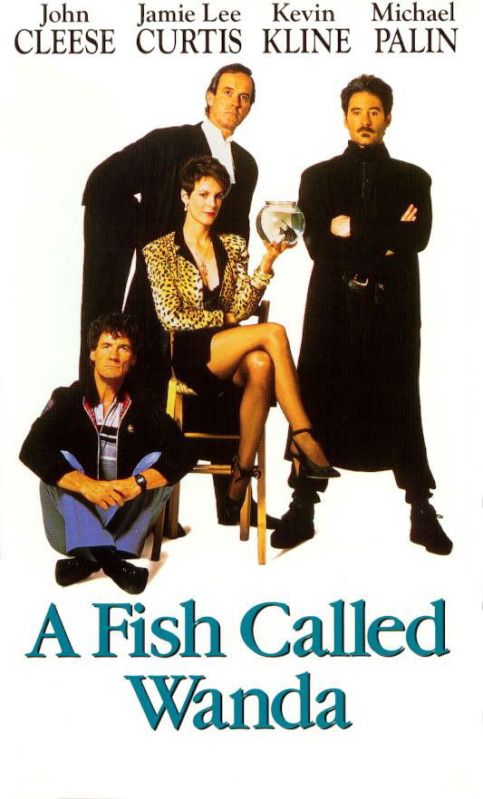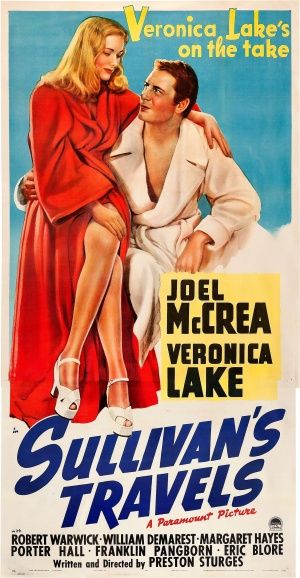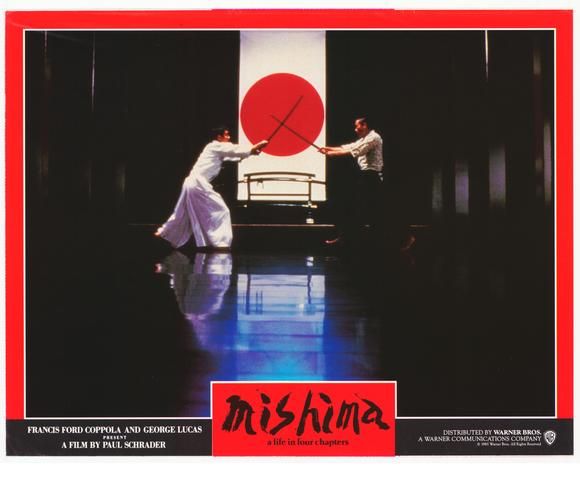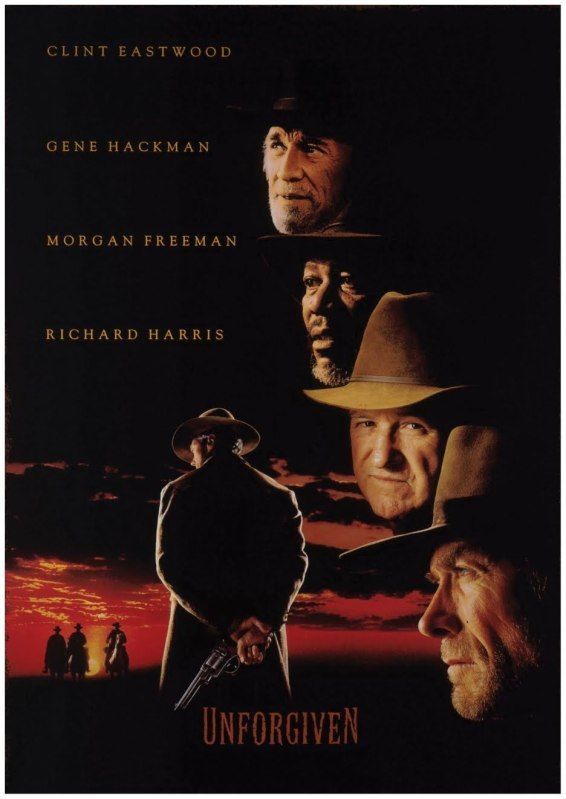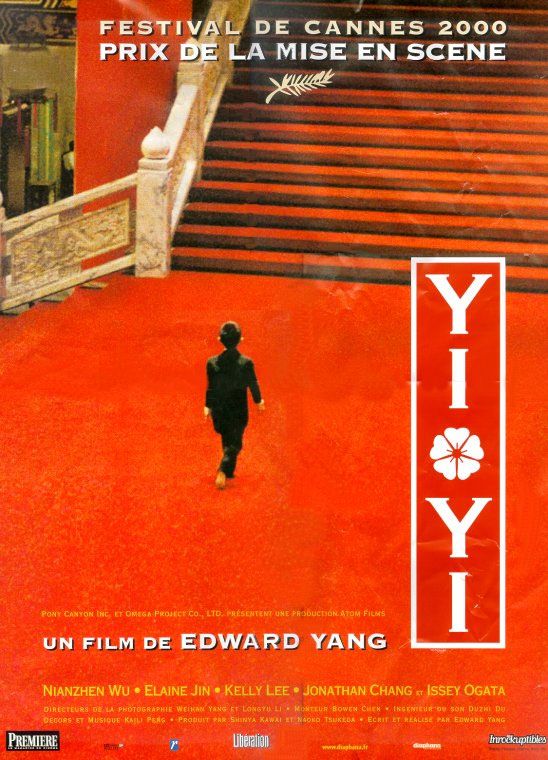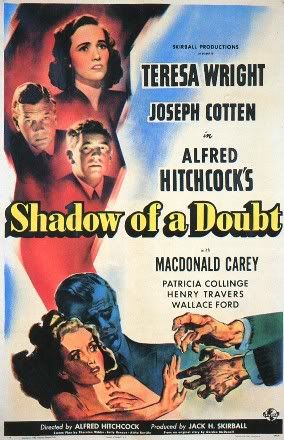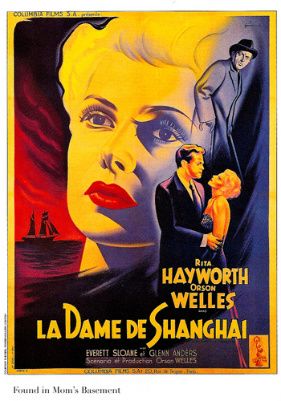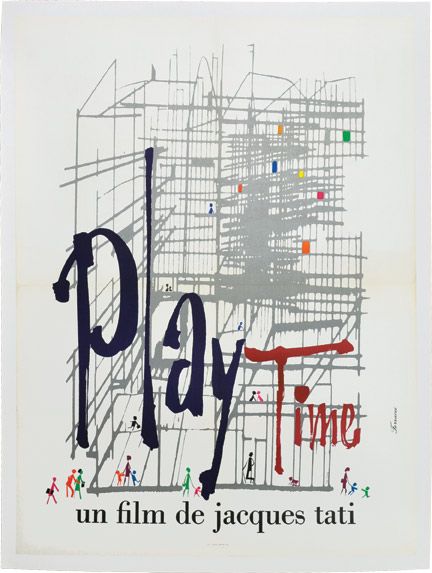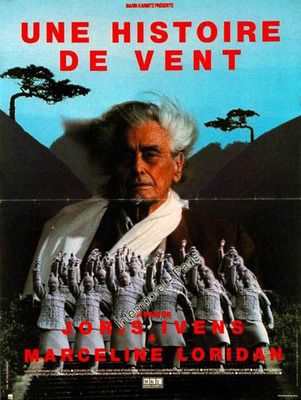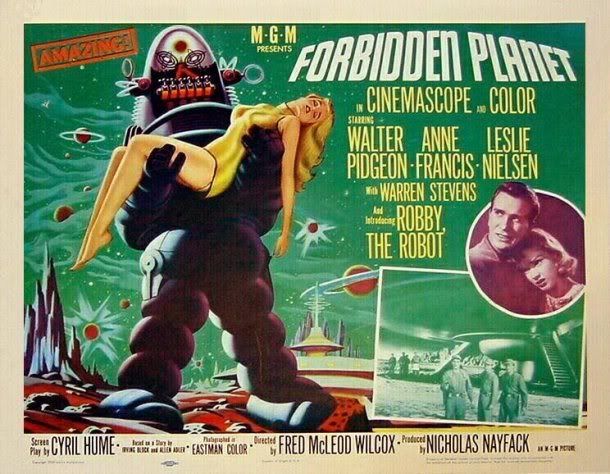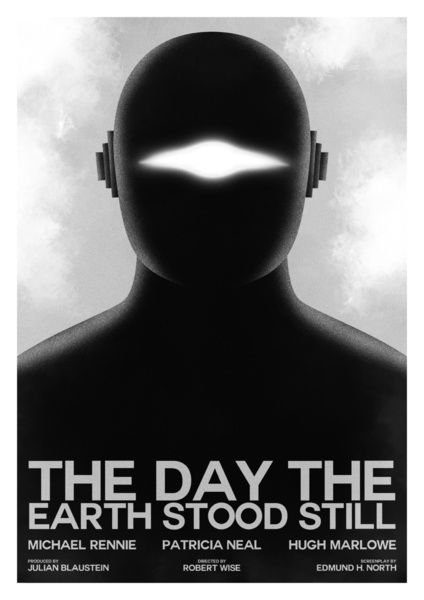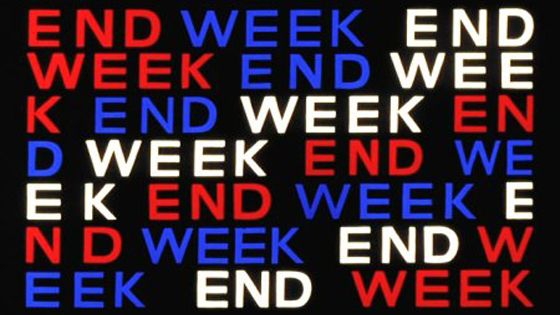Sunday, September 30, 2012
A Fish Called Wanda
A Fish Called Wanda
1988
Director: Charles Crichton (and an uncredited John Cleese)
Starring: John Cleese, Jamie Lee Curtis, Kevin Kline, Michael Palin
I am sitting here, literally giggling to myself, as I watch the opening credits of A Fish Called Wanda for the hundred billionth time. I’m giggling in anticipation of all the awesome jokes and scenes and comic genius I’m about to see.
Yeah, I’m kind of a fan of this film. Just a wee bit.
The plot focuses on a gang of jewel thieves and opens with their diamond heist. The gang consists of Wanda (Curtis), who is romantically involved with gang leader George; Otto (Kline), a pseudo-intellectual posing as Wanda’s brother while sleeping with her on the side; and Ken (Palin), a stuttering animal rights activist who seems far too kind to be in a gang at all. When Wanda and Otto double cross George without his knowledge, barrister Archie Leach (Cleese, and yes, let’s all laugh at the Cary Grant reference) takes on George’s defense case. Convoluted story short, Wanda must cuddle up to Archie in order to get information on where George stashed the diamonds before leaving the country, all while keeping George in the dark and slightly insane and overly aggressive Otto at bay.
Saturday, September 29, 2012
Sullivan's Travels
Sullivan’s Travels
1941
Director: Preston Sturges
Starring: Joel McCrea, Veronica Lake, Sturges’ stable of stock supporting staffers
I love screwball comedies, and if one loves screwball comedies, then Preston Sturges is like manna from heaven. No one made screwier screwballs than Preston. But poor Preston couldn’t leave well enough alone. Oh no, he had to go getting all serious, trying to make a “big social point,” and in my opinion, lost nearly all his magic with Sullivan’s Travels. That the film is typically regarded as his finest work is a bit beyond me.
Hollywood screwball comedy director John L. Sullivan (McCrea) wants to make a big serious drama, a movie that strikes at deep issues and social problems. His studio heads want him to make another comedy. In order to learn about poverty in America for his big serious drama, Sullivan decides to go on the road undercover as a hobo, with only ten cents in his pocket. Along the way he meets a charitable girl (Lake), and he eventually tells her who he really is. She insists on accompanying him as he continues his little experiment. Situational antics ensue.
I understand why Sturges wanted to make such a movie. It must be tough, being so brilliant at a genre of films that is easily discarded and denigrated. It’s something that hasn’t changed with time, either; consider, each year, how many dramas are nominated for Oscars, versus comedies. Sullivan, something of an alter-ego for Sturges, wants to make a “big important drama.” Well, why does he want to do this? He gives little reason, he’s just insistent to the point of absurdity that’s what he wants to do. My guess, for both Sullivan and Sturges, it is the desire to be taken seriously and to win some acclaim. Frankly, I can understand that desire. It’s always nice to have someone tell me that they realize how hard I work and they think I am doing a good job. The greatest comedies look so easy, and when something looks easy, most people tend to assume it didn’t require any work to create it.
Thursday, September 27, 2012
Mishima: A Life in Four Chapters
Mishima: A Life in Four Chapters
1985
Director: Paul Schrader
Starring: Ken Ogata
Ah, Mishima. Yet another sterling example of why I love, adore, and cherish 1001 Movies You Must See Before You Die. The first time I saw this movie, I had never heard of it and knew nothing about it. Half an hour in, I was a little confused, but beguiled. By the end of the film, my jaw was on the floor and my heart was in my mouth. It had shocked, stunned, and most importantly moved me. This movie is phenomenal.
Ostensibly a biopic, although more on that later, Mishima is about Japanese writer, poet, dramatist, actor, nationalist, and all around artist Yukio Mishima, brilliantly portrayed by Ken Ogata (he who broke my heart over and over again in The Ballad of Narayama). Mishima is a legendary figure in modern Japanese history, and the film opens on the day in 1970 that he and four members of his private army successfully broke into a Japanese garrison and held the general hostage. We flash back to various earlier points in Mishima’s life and various pieces of fiction he wrote, a significant portion of the film, all while returning occasionally to the day of the garrison raid. By interweaving the art with the life of the man, Schrader paints one of the best cinematic portraits of an artist I’ve ever seen.
Tuesday, September 25, 2012
Unforgiven
Unforgiven
1992
Director: Clint Eastwood
Starring: Clint Eastwood, Gene Hackman, Morgan Freeman, Frances Fisher, Richard Harris
Clint Eastwood made a lot of westerns in his career. His is a face that is forever linked with the genre. Unforgiven plays like a swan song; indeed, thus far, it’s the last western Eastwood made. It feels like Eastwood is thanking the genre for what westerns have done for him as he gracefully exits stage left.
A cowboy attacks a prostitute with a knife, cutting up her face. This prompts the madam at the brothel, Strawberry Alice (Fisher), to call for the man’s blood. The sheriff in town, Little Bill (Hackman), decides on a much more sedate punishment, prompting Alice to offer reward money. First to town comes outlaw English Bob (Harris), who is promptly dealt with by Little Bill. But the money also tempts William Munny (Eastwood) out of retirement, along with his friend Ned Logan (Freeman), leading to the inevitable showdown.
Sunday, September 23, 2012
Yi Yi
Yi Yi (A One and a Two…)
2000
Director: Edward Yang
Starring: Nien-Jen Wu, Kelly Lee, Jonathan Chang
Yi Yi focuses on the life of a Taiwanese family living in Taipei in 1999. The father NJ (Wu) has two children, a teenage daughter Ting-Ting (Lee) and a young son Yang-Yang (Chang). Around them swirls the extended family and neighborhood: a broke and bumbling brother-in-law and his young pregnant wife, the grandmother who starts the film by falling into a coma, and the apartment neighbors who argue loudly and often. The movie takes place over the course of about one year as we watch this family go through the typical trials and tribulations of life.
In a film as rambling as this, filled with many small moments but no overall narrative direction, it practically invites the viewer to interpolate their own meaning. For me, throughout nearly all the vignettes, I got the feeling of the sorrow of banality. Is life really meant to be simply a series of repeated days, one exactly like the other? The mother’s speech when she is in the throes of an existential crisis nicely sums up this particular point. There is so much of the mundane in this film; the father’s work seems utterly boring and life-draining, as does the mother’s. The wedding that opens the film seems less a celebration and more a strange party at which drunkards, fools, and bullies waste their time. I don’t see Yang as delineating the joy of the little things, but more the pathos of them.
Labels:
1001 movies,
2000,
2000s,
8 out of 10,
edward yang,
foreign,
taiwanese,
yi yi
Saturday, September 22, 2012
Shadow of a Doubt
Shadow of a Doubt
Director: Alfred Hitchcock
Starring: Teresa Wright, Joseph Cotten
1943
When Francois Truffaut interviewed his mentor Alfred Hitchcock, Hitchcock himself admitted that this film was his personal favorite. Indeed, the DVD extras have a featurette entitled “The Making of Hitchcock’s Favorite Film.” This is definitely a Hitchcock film in terms of suspense and danger, but there’s a lovely sense of restraint and understatement in it, as compared to his phenomenal – but flashy – films like Rear Window or North by Northwest.
Young Charlie (Teresa Wright) is bored to tears in her small town life, until her much beloved and fascinating namesake Uncle Charlie (Joseph Cotten – no, Microsoft Word, I did NOT spell that word incorrectly) decides to pay the family a little visit. Young Charlie is delighted, as is everyone else, until she starts to suspect that her uncle might be… well, he might be up to no good. A growing sense of dread and unease builds as young Charlie tries to grapple with conflicting feelings – before it’s too late.
Tuesday, September 18, 2012
The Lady From Shanghai
The Lady from Shanghai
Director: Orson Welles
Starring: Orson Welles, Rita Hayworth, Everett Sloane
1947
Orson Welles is such an enfant terrible. His films are brassy and bold, ballsy and gutsy, flying in the face of tradition. With The Lady from Shanghai, Welles, married to Rita Hayworth at the time, managed to piss off most of Hollywood by taking Hayworth’s gorgeous long red locks, cutting them all off, and dying them blonde. This move, heretical in terms of Hollywood’s star system, sets the tone for the rest of the film. Welles set out to make a film noir, and ended up making a film noir on crack.
Welles plays Michael O’Hara, a sailor who becomes infatuated with beautiful Elsa Bannister (the gorgeous Hayworth), only to find out she’s married to a leech of a cripple of a criminal lawyer (Sloane). Bannister the lawyer employs O’Hara on his yacht, practically inviting danger, and when things turn murderous, everyone’s in trouble.
Sunday, September 16, 2012
Playtime
Playtime
1967
Director: Jacques Tati
Starring: Jacques Tati and his sets
Director Jacques Tati’s third film starring his own character Monsieur Hulot, Playtime is a significant deviation from the previous two Hulot comedies. It takes on larger issues and is, in my opinion, darker and bleaker. Less about the individual than society as a whole, the film is also nothing short of a visual treat, essentially being two hours of nonstop sight gags.
The story, which is very limited and not the focus, centers somewhat around Monsieur Hulot (Tati) as he finds himself in the big city, ultimately revealed to be Paris. Everything is sleek, modern, and technological to the point of utter absurdity. In an office building, Hulot tries to navigate his way around. At night, he gets invited into the modern home of an old friend. We then spend an extended sequence at a nightclub that has just opened up where nothing is quite yet working. The film concludes with a carnival sequence.
Labels:
1001 movies,
1960s,
1967,
8 out of 10,
foreign,
french,
playtime,
tati
Saturday, September 15, 2012
A Tale of the Wind
A Tale of the Wind
1988
Director: Joris Ivens
Starring: Joris Ivens
It’s very difficult to categorize this film. It’s a little bit of a documentary, but then it’s not. It’s a bit of a surrealistic film, but then it isn’t. It’s from a famous artistic director whom I’ve never heard of before. There are gorgeous shots of nature, and then completely artificial set pieces.
Experimental cinema? You betcha. But unlike obnoxious experimental films, there is a distinct sense of whimsy and magic laced throughout A Tale of the Wind that makes the sense of incomprehensibility go down that much easier.
Thursday, September 13, 2012
The Rules of the Game
The Rules of the Game
Director: Jean Renoir (yes, related to THAT Renoir)
Starring: Marcel Dalio, Nora Gregor, Roland Toutain, Jean Renoir
1939
The Rules of the Game is a difficult film to review for its sheer enormity. Right up there with Citizen Kane, Casablanca, and The Godfather, it is consistently considered one of the ten best films ever made. The only reason you may never have heard of it before is the fact that it’s French, and American audiences aren’t the keenest when it comes to foreign films, but it is a daunting subject for any lover of film to undertake. After all, what can I possibly say about The Rules of the Game that hasn’t already been said elsewhere?
The answer to that difficult question (the question which, by the way, has kept me from writing about the other great films mentioned above) is to regale the reader with my personal relationship with the film. When I first saw The Rules of the Game, it didn’t have much impact. I took it at face value. Man, if there’s ever a film to be a little patient with in order to peel away the outer layers, it’s this one. I then saw it a second time not long after because it was playing on the big screen. Still not that much of an impact. Years passed, and although I had the presence of mind to pick up the DVD when it went on sale, the DVD went unwatched… until today. I did a little bit of reading before watching it, watched the introduction on the DVD by the director, and suddenly found myself entranced, moved, and unexpectedly crying at the end of the film. Now I am starting to understand The Rules of the Game. Now I am feeling its impact.
At face value, The Rules of the Game is a comedy of manners – and I would never say this wasn’t a comedy. The plot centers around married couple Christine (Gregor) and Robert La Chesnaye (Dalio) and their respective lovers, Andre (Toutain) and Genevieve (Mila Parely). A group of guests are invited to La Chesnaye’s country estate for a hunting party. There are machinations, secrets, revelations, and, ultimately, a tragedy. The lives of the servants downstairs blindly imitate those of their masters, as Christine’s maid Lisette finds herself juggling more than one man as well. It’s very Gosford Park in this respect – as a matter of fact, these two films would make a pretty decent double feature.
Tuesday, September 11, 2012
Forbidden Planet
Forbidden Planet
1956
Director: Fred M. Wilcox
Starring: Leslie Nielsen, Walter Pidgeon, Anne Francis
“In the final decade of the 21st century, men and women in rocket ships landed on the moon.”
Oh, from this laughable beginning starts the incredibly silly yet legitimately entertaining sci-fi ride that is Forbidden Planet. The film was made in 1956; I mention this because it’s incredibly important when considering the more ludicrous parts of the film. Think of it – this film is pre-Sputnik. Humans had never put anything into space – ever. Star Trek was a thing of the future, and Star Wars was considerably far off. Hollywood is to be somewhat forgiven, then, with their bizarrely stereotyped image of space exploration and adventure.
The crew of an elite (and fundamentally American) space ship is sent to a distant planet for a search and rescue mission stemming from a lost colony 20 years earlier. On landing on the eerily earth-like planet, the captain, played by Leslie Nielsen (yes, THAT Leslie Nielsen, more on that later) is greeted by the somewhat unnerving Doctor Morbeus (Pidgeon), apparently the only survivor of the failed colonization, his beautiful daughter Altaira (Francis), and the helpful domestic Robby the Robot, the first of Robby’s many subsequent Hollywood appearances. Morbeus warns the captain and his crew to leave at once, that the rest of the settlers were killed in horrible ways, that they must flee if they want to keep their lives. The captain says no. While a romance develops between the captain and Altaira, scary and inexplicable things do indeed start happening to the crew. The truth of the horror is, well, a little cheesy and a bit overly complicated, but the film has a satisfying conclusion nonetheless.
Sunday, September 9, 2012
The Day The Earth Stood Still
The Day the Earth Stood Still
1951
Director: Robert Wise
Starring: Michael Rennie, Patricia Neal, Sam Jaffe, Billy Gray
I’m intrigued by the many different forms science fiction can take. There’s plenty of science fiction that’s lots of men in funny rubber suits playing funny rubber aliens, nothing more than battles with laser guns on silly Martian sets. On the other hand, I’ve seen a number of science fiction films that have zero special effects, zero makeup, zero costumes, but are absolutely still sci-fi because of an otherworldly premise. The best science fiction utilizes its otherworldly setup to bring home a message of humanity. The Day the Earth Stood Still indulges in special effects, but its point is tremendously clear: this is a message movie, through and through.
The nations of the world are all thrown into disarray when an alien spaceship is found to be circling the earth. After landing in Washington D.C., alien Klaatu (Rennie) and his huge robot Gort step off the ship, only to be immediately fired upon by the amassed military. Klaatu is taken to a hospital where he requests to speak to representatives from all countries in one meeting to warn them of an impending peril. Frustrated by the world’s inability to convene such a meeting, he escapes the hospital where he meets both a young widow (Neal), her son Bobby (Gray), and a scientist (Jaffe), and he again tries to pass his message on to them.
Friday, September 7, 2012
Week End
Week End
1967
Director: Jean-Luc Godard
Starring: Mirielle Darc, Jean Yanne
I’m not a fan of French New Wave. I know, right? How can I consider myself a fan of films if I don’t pee myself over French New Wave films? Well, it’s true. I can absolutely appreciate everything that the French New Wave did to change film, yet I’d never count a single one of them amongst my favorites. I do not enjoy them. Godard, in particular, is troubling for me. I have never felt entertained or amused or even moved by a Godard film. Instead, I tend to just sit there with a look of “WTF?” on my face. Have I completely ruined any credibility I may have had by now?
The “plot” is about Roland (Yanne) and Corinne (Darc), an upper class married couple who openly want to murder the other. They go for a getaway on a weekend to visit her father, who they also want dead, and along the way, increasingly tragic and violent (and bizarre) things happen to them.
To me, when I think French New Wave, and ESPECIALLY Godard, I think about rule-breaking. To me, that was what the Nouvelle Vague was all about, and by breaking tried and true cinematic “rules,” it managed to move cinema light years into the future. Like any Godard film, there is all kinds of rule-breaking in Week End, both cinematically, narratively, and sociologically.
Labels:
1001 movies,
1960s,
1967,
6 out of 10,
foreign,
french,
godard,
week end
Tuesday, September 4, 2012
Manhattan
Manhattan
1979
Director: Woody Allen
Starring: Woody Allen, Mariel Hemingway, Diane Keaton, Meryl Streep
Despite the fact that I’ve now written about a hundred reviews for films from 1001 Movies You Must See Before You Die, I have not yet reviewed a Woody Allen movie. Oh, Woody Allen. You give me so many problems. He and I have a very love-hate relationship. Occasionally, I really love one of his movies. Most of the time, I rather hate them. So consider this review to be Part One of my Standard Woody Allen Rant, which shall no doubt repeat itself for nearly every one of his films in the book.
The plot of Manhattan is very typical Allen neurotic comedy. Isaac (Allen) is a forty-two year old television writer who is dating Tracy (Hemingway), a seventeen year old high school student. His ex-wife (Streep) left him for another woman and is now writing a book about the breakup. He falls in love with his married best friend’s mistress Mary (Keaton), which of course means that there is a great deal of hemming and hawing and complaining about relationships. Whiny neuroticism ensues.
Sunday, September 2, 2012
The Wicker Man
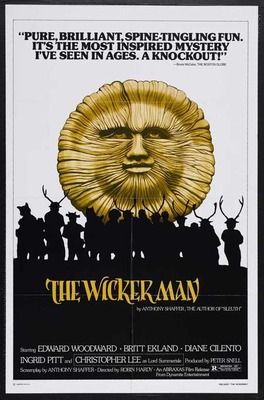
The Wicker Man
1973
Director: Robin Hardy
Starring: Edward Woodward, Christopher Lee, Diane Cilento
Horror is a very personal genre. What scares one person doesn’t affect someone else in the slightest. Like comedy, it’s impossible to make a scary movie that can get under everyone’s skin. While The Wicker Man is not a horror movie through and through, it certainly has certain classic horror elements, and although tame by today’s bloodbath torture porn, it still has the ability to be creepy. I can see why some would find it ridiculous, but personally, I find The Wicker Man disturbing.
More a mystery, perhaps, than a horror film, the story focuses on Scottish cop Sergeant Howie (Woodward) who goes to the island of Summerisle to investigate the disappearance of the young girl Rowan Morrison. When he gets there, though, all the locals deny ever knowing Rowan, let alone being able to help him in his investigation. Moreover, the longer he’s on the island, the more he’s exposed to, and offended by, the free love pagan rituals that start to show up. Howie, a devoted Christian, clashes with Lord Summerisle (Lee) and the local schoolteacher (Cilento) over “proper practices” for worship and education.
Subscribe to:
Posts (Atom)
